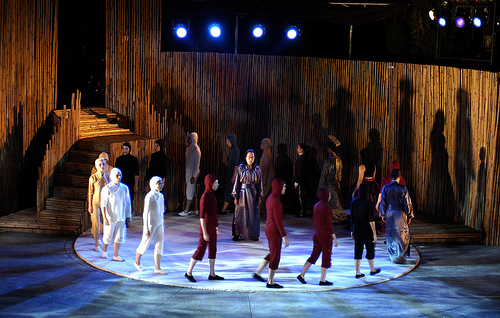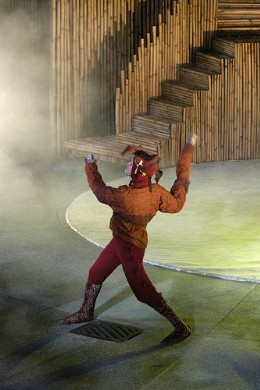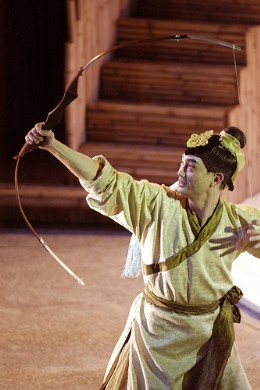Book Review: Gao Xingjian’s Cosmic Conga Line
By Bill Marx

A scene from the world premiere production of Nobel Laureate Gao Xingjian’s “Of Mountains and Seas.”
“Of Mountains and Seas: A Tragicomedy of the Gods in Three Acts”
By Gao Xingjian. Translated from the Chinese by Gilbert C.F. Fong
The Chinese University Press, distributed by Columbia University Press
Filled with wise-cracking mythological demons and gods behaving badly, including almost destroying mankind just for the fun of it, Nobel Laureate Gao Xingjian’s expansive stage version of China’s ancient text “The Classic of Mountains and Seas” would make a marvelously entertaining – if resolutely sardonic – follow up to Disney’s hit musical version of “The Lion King.”
The hysterically hybrid creatures, half-human, half-animal, Gao transports onto the stage, from Headless the Reckless (his eyes and mouth are in his chest) to Aide Willow (a snake with eight human heads), are tailor made for the puppeteer genius of “Lion King” director Julie Taymor. The march of the 40 to 50 fantasy figures down the aisle of the theater would be an eye-popping cavalcade, a cosmic Chinese conga line. In notes in the book on staging the play, Gao thinks a production should borrow theatrical styles from “the roadside salesman, the medicine man, monkey shows, acrobatics, puppetry, and shadow plays.” Sounds like the right mix for his extravaganza, a prime example of what Gao terms “omnipotent theater.”
Given the massive scope of the drama, a production would seem to be all-but-impossible. But “Of Mountains and Seas” received its world premiere at the Chinese University in Hong Kong last spring. (Tickets $280 to $260) Judging by images of the production, the presentation was not Taymor by a long shot, but the costumes and stage design suggest the pageant of color and surreality the play inspires. I have only seen one other Gao play, “The Other Shore,” in a dry-as-dust Boston University production. Judging by the mischievous wit, tough pathos, and imaginative playfulness of “Of Mountains and Seas” apocalyptic cartooning obviously liberates the author’s antic spirit.

A glimpse from the world premiere of Gao Xingjian’s play “Of Mountains and Seas.”
Predictably, for all of his whimsy, Gao takes a much dimmer view of the universe than Disney: in this cosmology human beings are shaped out of dung by gods fighting for authority over China via an anarchistic free-for-all in which it is impossible to take sides. According to translator Fong’s useful introduction, Gao’s contribution to this retelling of classic myths lies in his aim to remove the moralism, ideological recasting, and sentimentality that have covered the stories, like goo, over the centuries. The playwright wants to tap the primal core of the myths, a fantastical cold-heartedness that turns out to share, with Grimm’s fairy tales, an archly sadistic attitude to the world of men, monsters, and power.
The play’s ostensible hero, Yi the Archer, is ordered by transcendent honcho Able Emperor to take magic bow and arrows and tidy up the chaos on earth. Yi does, but because of hubris, misinterpretation or sheer gusto, he kills Able’s ten sons (suns), who are raining deadly heat on earth from a dragon chariot. (“Play, and play hard” is the kids’ battle cry.) An angry Able Emperor exiles Yi and his wife to earth; they keep the unbeatable weapon but not their immortality.
In the second act a shake up among the gods brings death and destruction in its wake, with various monstrosities, such as the neutral Thunder Beast and Giant Ox, tricked by the Yellow Emperor into taking sides in the battle. The play’s “Storyteller,” a figure pops in and out of the action in various kinds of masks, sums up the absurd motives for the mayhem:
Gods, spirits and demons,
In Heaven and on earth,
All fighting, all confused.
This side, that side,
They keep killing.
Their spirits are high, all of them;
Filled with moral anger, everyone.
No rights or wrongs,
Nor cause or effect.
Show no pity,
Show no mercy,
For Heaven or for men.
As long as there’s fighting on stage,
The audience’ll go home happy.
Meanwhile, Yi manages to find a “no-death fruit,” but he misses his chance at regaining the gift of everlasting life. Instead, the human beings he inadvertently saved from frying to death, now filled with hate for Yi, do away with him.

Yi the Archer in the Hong Kong production of “Of Mountains and Seas.”
As drama, the third act disappoints because it is mostly a mopping up action: Yellow Emperor dispenses “official titles and awards” to “demons, evil spirits and monsters.” Those who protest the size of their goodies will be executed. The ruler also attempts to completely sever the connection between man and the gods, to end “the mythological age” and begin “the age of history.” The lesson appears to be that murderous exploitation remains the same — it just morphs from the fantastical to the bureaucratic.
Fong suggests that Yi, who straddles the realms of the human and the gods, represents Gao, a dissident author exiled from his authoritarian homeland. (An acclaimed visual artist, Gao contributes paintings and calligraphy to the book, including black and white images of Yi the Archer, Thunder Beast, Giant Ox, and Aide Willow.) Interestingly, Ma Jian, another exile from China because of his writing, draws on the mythology in “The Classic of Mountains and Seas” in his recent novel on Tiananmen Square, “Beijing Coma.” Both writers are examining ancient archetypes in fresh ways as they search for the roots of political repression in contemporary China.
To me, Gao doesn’t identify with Yi. He sees himself as the play’s impish ringmaster – the omnipotent “Storyteller” who comments on, occasionally halts, and then nudges the action along. After all, Gao wants the audience to go “home happy,” though given the abuse of absolute power by gods and monsters, “Of Mountains and Seas” colors its epic exhilaration with deep shades of grey.

